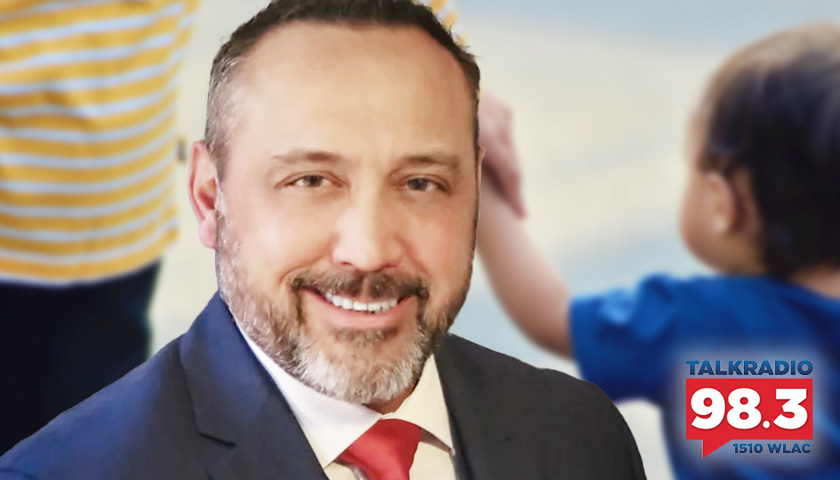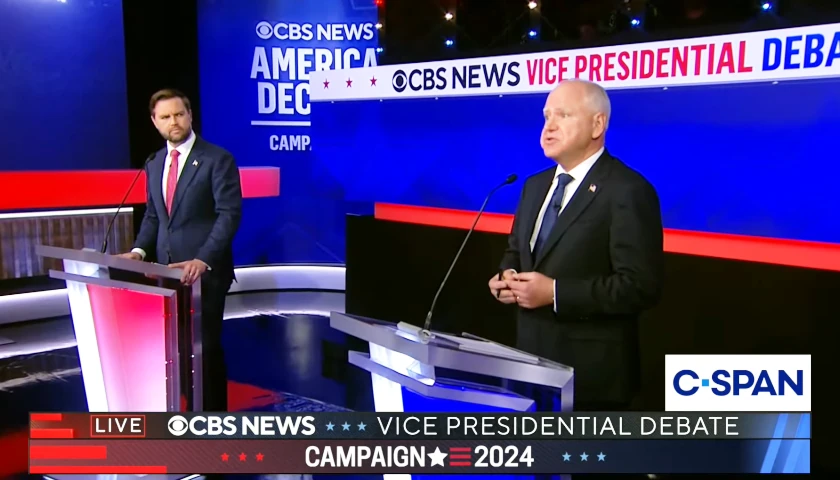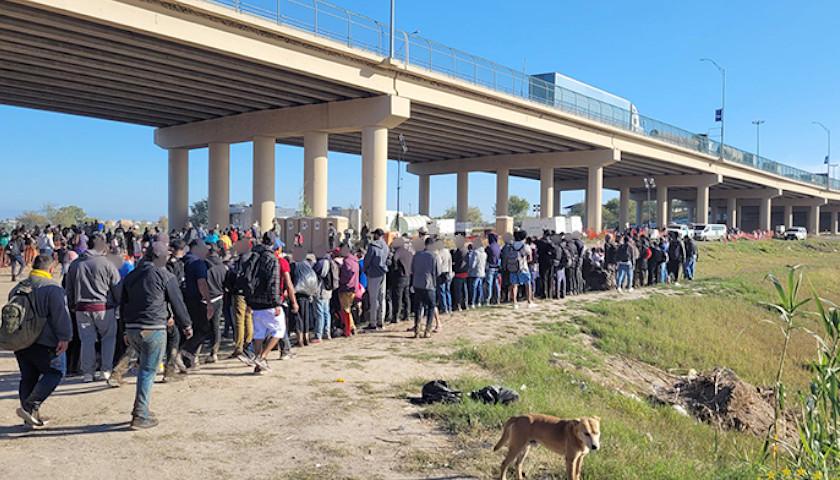Live from Music Row, Monday morning on The Tennessee Star Report with Michael Patrick Leahy – broadcast on Nashville’s Talk Radio 98.3 and 1510 WLAC weekdays from 5:00 a.m. to 8:00 a.m. – host Leahy and co-host Crom Carmichael welcomed Mission America Foundation’s Aaron Spradlin in the studio to explain the different types of child sex trafficking that occur in the state and on the national level.
Leahy: Aaron Spradlin is with us, our guest, and he’s got a nonprofit called Mission America. And I think one of the reasons you want to come in is there’s a story that we published over the weekend – “Tennessee Leads the Nation in Efforts to Stop Sex Trafficking” is the headline. You want to take exception to that story here.
Spradlin: A little bit. Well, and you know what? I’m not going to take away from what Tennessee is doing, but if we are a “B” on the A-B-C-D-E-F rating …
Leahy: That’s what the rating is by the 2022 report cards on child and youth sex trafficking. I don’t know what group puts that together, but there is such a group, and they gave Tennessee a “B.”
Spradlin: And put us at number one in the nation at fighting it. Now, here’s the hard part and the ugly part about this. If we’re a “B,” how bad is the rest of the country?
Leahy: Give us a snapshot of what your group, Mission America [Foundation], does to fight sex trafficking. And of all the nonprofit missions in the world, why did you pick that mission for Mission America?
Spradlin: Sure. So a real brief “Reader’s Digest” version: Mission America is twofold. We are a veterans organization that gives purpose and mission to veterans so that they can use their skills to go out and influence the awareness of what we do, of trafficking in America.
I spent a great deal of time working for other organizations around the world, and I started looking at the statistics and realized that 1.2 million children are trafficked around the world every year, and 365,000 of them are trafficked here.
Leahy: In the United States.
Spradlin: In the United States.
Leahy: When you say trafficked – people say “trafficked,” but let’s give us a very specific description of a typical trafficked child, age, and what happens to them?
Spradlin: Unfortunately, it’s kind of broad, but I’ll give you the best example that I can. You’re mostly going to deal with runaways. You’re going to deal with children that are trafficked by people that they know.
Leahy: So, runaway kids?
Spradlin: Runaway kids, or families are trafficking their own children.
Leahy: Okay, so let’s talk about when you say trafficked.
Spradlin: They’re prostituting their own children.
Carmichael: How frequently is that?
Spradlin: Daily?
Carmichael: I understand daily.
Spradlin: On a national scale, it’s every two minutes, but what do you mean?
Carmichael: Okay, comparing the two: One, where child trafficking is an organized crime deal, and the other is parents trafficking their own children. I know they’re both child trafficking. Are they related to each other? Legalized crime, organized crime? Are the parents working through organized crime?
Spradlin: In some cases. For instance, in our state in Tennessee, where it’s very heavy in East Tennessee, the parents just trade the child for meth.
Leahy: In eastern Tennessee?
Spradlin: Heavy. I got a whole article here talking about it.
Carmichael: Wow.
Spradlin: TBI had 13 investigations last year in just East Tennessee – 130 people.
Leahy: So what would be the typical age of a trafficked child?
Spradlin: Under 13.
Leahy: Under 13? And a child under 13, then, is prostituted – engaged in various sexual acts for money?
Spradlin: Yes.
Carmichael: Or for drugs.
Spradlin: Or for drugs. Now, here’s the biggest thing about this “B” rating. When we started this fight in 2016, 76 out of 95 counties had trafficking under the age of 13. TBI report. I’m not making it up. You can look it up – 76 out of 95 …
Leahy: Had at least one instance of it.
Spradlin: At least one instance. Now we’re 95 out of 95. So if we’re so good at fighting it, how bad is everybody else?
Carmichael: What is the penalty when a parent is caught trafficking their own child for prostitution?
Spradlin: Eight to 30 years. It’s a felony.
Carmichael: And then is it both parents?
Spradlin: I can’t go into that. I would say if you could build a case, yes, it’d be both parents because they’re in it together.
Carmichael: Then the child becomes a ward of the state.
Spradlin: A ward of the state, which is just as horrible as anything else.
Leahy: But in essence, a child under the age of 13, trafficked for purposes of sexual prostitution …
Spradlin: Or labor.
Leahy: Or labor?
Spradlin: Yes, sir.
Leahy: Interesting. When I hear it, trafficking, it’s mostly … in public, it’s for prostitution purposes. Isn’t that child, the minute they’re engaged in that activity for the very first time, aren’t they pretty much ruined for life?
Spradlin: No. There’s hope. No, I’m not going to do that. You have the cycle of trauma, and if you can get to that child before they hit a phase in the cycle of trauma, you can reverse it.
Leahy: Tell me what the cycle of trauma is.
Spradlin: Okay, so you have the trauma that actually happens, the event. The next one is the anger, the next is the shame, and followed by depression. And it becomes a circle, and it constantly flows. You relive it over and over and over.
Leahy: So let’s say a child who’s set up for sex trafficking and is prostituted by their parents or whoever takes over them, this is not a single instance of that activity.
Spradlin: Oh no.
Leahy: It’s like multiple instances, right?
Spradlin: Yes. And here’s the sad part. And this is where we really get into it. When I speak on this – I was just in Wilson County two days ago speaking on the very topic. It costs $250,000 at the minimum to start the healing of a child sex-traffic victim through the therapy and everything that goes with therapy.
Leahy: It’s a therapist …
Spradlin: And all that sort of stuff, and a place to live and detox and everything that goes into that. And we don’t have a system structured for that in the state of Tennessee. So I get on my dadgum soapbox and I start preaching.
We beep the horns all over the state capital for the state income tax. Why don’t we fight for the children and get the money involved?
Leahy: I think what you’re suggesting, then, do you have a proposed appropriation bill to put before the Tennessee General Assembly for this purpose?
Spradlin: As a matter of fact, we’re starting to talk about that right now.
Leahy: Okay, you don’t have a bill.
Spradlin: We do not have a bill, but we’re starting the conversation. We were recognized last year with a joint resolution by the state House, and they’re listing to us., so that means something.
Leahy: First you’ve got to stop the trafficking, then you’ve got to fix the kids. And that’s a long process.
Spradlin: And you’ve got to increase the punishments. Now, you asked me the question about what happens if the parents are selling the kids. If I knowingly engage in sexual activity with a child in the state of Tennessee, it’s the same as a DUI. A Class A misdemeanor, $2,500 fine, 1129 dismissed, because I knew I did it. That’s not the parent, that’s the John.
Leahy: If you look at the actual prosecution and conviction rates for these kinds of crimes, what have they been over the past five years?
Spradlin: I can’t speak to that, but I can speak to this. We’ve had all these undercover stings and operations that we’ve used in the state of Tennessee. And I go all the way back to the former administration that was actually making a dent in this in America under President Trump.
And then, of course, when the Democrats came in, Biden immediately destroyed the trafficking task force, because (spoken dryly, facetiously) that’s something you need to do.
Listen to today’s show highlights, including this interview:
– – –
Tune in weekdays from 5:00 – 8:00 a.m. to The Tennessee Star Report with Michael Patrick Leahy on Talk Radio 98.3 FM WLAC 1510. Listen online at iHeart Radio.
Photo “Aaron Spradlin” by Mission America Foundation. Background Photo “Adult Holding Child’s Hand” by Endho.





